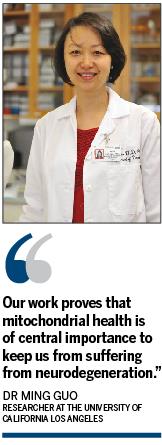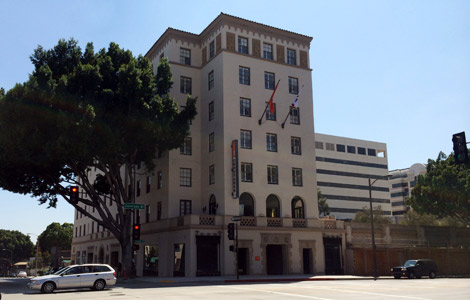Gene to fight Parkinson's discovered at UCLA labs
Updated: 2014-09-02 04:30
By AMY HE in New York(China Daily USA)
|
||||||||
Researchers at the University of California Los Angeles, led by Dr Ming Guo, have identified a new gene involved in Parkinson's disease, which may help find a cure or even prevent the neurological disorder, the school said.
In a study published by Guo and her team, the researchers said they discovered the MUL1 gene (also known as MULAN and MAPL) that helps reduce the amount of damage done by mutated genes to mitochondria, which helps neurons maintain brain health. In Parkinson's disease, neurons in the brain break down or die.
There is no known cure for Parkinson's and there are about 60,000 new diagnoses of the disease in the United States every year. Patients experience tremors, trouble walking, and slowness in movement., all of which worsen over time. Parkinson's may also cause depression, anxiety, sleeping difficulties and dementia.

Comedy icon and actor Robin Williams, who committed suicide last month, struggled with depression, anxiety and early stages of Parkinson's , which he kept secret, his wife said in a statement.
Guo's lab collaborated with Dr Sheng Zuhang from the National Institutes of Health on the study.
"We show that MUL1 dosage is key and optimizing its function is crucial for brain health and to ward off Parkinson's disease," said Guo in a statement. "Our work proves that mitochondrial health is of central importance to keep us from suffering from neurodegeneration. Finding a drug that can enhance MUL1 function would be of great benefit to patients with Parkinson's disease."
Guo, a practicing neurologist and an associate professor of neurology and pharmacology at the school, and her colleagues published their five-year study about the finding in the biomedical journal eLife in June. In the study, mice and fruit flies which had MUL1 removed had "unhealthy mitochondria and degeneration of the neurons", UCLA said.
"This finding is a major advance in Parkinson's disease research," Guo said. "There are several implications to this work, including that MUL1 appears to be a very promising drug target and that it may constitute a new pathway regulating the quality of mitochondria."
The team wants to test the results on more complex organisms to see how MUL1 works, UCLA said, and will work on identifying compounds that could "specifically target MUL1 and examine whether mutations in MUL1 exist in some people with inherited forms of Parkinson's".
Guo's team was one of two groups that in 2006 found that two genes — the PTEN-induced putative kinase 1 (PINK1) and Parkin — act together to maintain mitochondria health, and that mutations in the genes led to early-onset Parkinson's disease.
When working properly, these two genes "maintain the regular shape of healthy mitochondria and help cells eliminate damaged mitochondria", according to UCLA.
According to UCLA, "it is estimated that as many as 1 million Americans live with Parkinson's disease — more than the number of people with multiple sclerosis, muscular dystrophy and Lou Gehrig's disease combined."
According to the Mayo Clinic, there are medications that may reduce symptoms, such as those that increase or substitute dopamine, a kind of neurotransmitter in the brain. People with Parkinson's disease have "low brain dopamine concentrations", the clinic said on its website.
amyhe@chinadailyusa.com
Most Viewed
Editor's Picks

|

|

|

|

|

|
Today's Top News
US doctor in Liberia tests Ebola positive
China's August PMI decreases, but slightly
Monopoly probes treat firms equally
Gene to fight Parkinson's discovered at UCLA labs
China's Uncle Sam ready to test US market in NYC
Beijing spruces itself up for APEC summit
New Budget Law to change the game
Microsoft asked to explain monopoly accusations
US Weekly

|

|
















